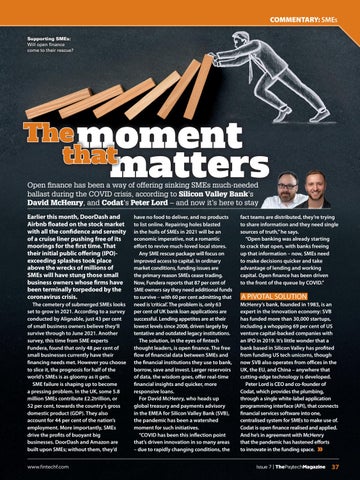COMMENTARY: SMEs Supporting SMEs: Will open finance come to their rescue?
The moment that
matters
Open finance has been a way of offering sinking SMEs much-needed ballast during the COVID crisis, according to Silicon Valley Bank’s David McHenry, and Codat’s Peter Lord – and now it’s here to stay Earlier this month, DoorDash and Airbnb floated on the stock market with all the confidence and serenity of a cruise liner pushing free of its moorings for the first time. That their initial public offering (IPO)exceeding splashes took place above the wrecks of millions of SMEs will have stung those small business owners whose firms have been terminally torpedoed by the coronavirus crisis. The cemetery of submerged SMEs looks set to grow in 2021. According to a survey conducted by Alignable, just 43 per cent of small business owners believe they’ll survive through to June 2021. Another survey, this time from SME experts Fundera, found that only 48 per cent of small businesses currently have their financing needs met. However you choose to slice it, the prognosis for half of the world’s SMEs is as gloomy as it gets. SME failure is shaping up to become a pressing problem. In the UK, some 5.8 million SMEs contribute £2.2trillion, or 52 per cent, towards the country’s gross domestic product (GDP). They also account for 44 per cent of the nation’s employment. More importantly, SMEs drive the profits of buoyant big businesses. DoorDash and Amazon are built upon SMEs; without them, they’d www.fintechf.com
have no food to deliver, and no products to list online. Repairing holes blasted in the hulls of SMEs in 2021 will be an economic imperative, not a romantic effort to revive much-loved local stores. Any SME rescue package will focus on improved access to capital. In ordinary market conditions, funding issues are the primary reason SMEs cease trading. Now, Fundera reports that 87 per cent of SME owners say they need additional funds to survive – with 60 per cent admitting that need is ‘critical’. The problem is, only 63 per cent of UK bank loan applications are successful. Lending appetites are at their lowest levels since 2008, driven largely by tentative and outdated legacy institutions. The solution, in the eyes of fintech thought leaders, is open finance. The free flow of financial data between SMEs and the financial institutions they use to bank, borrow, save and invest. Larger reservoirs of data, the wisdom goes, offer real-time financial insights and quicker, more responsive loans. For David McHenry, who heads up global treasury and payments advisory in the EMEA for Silicon Valley Bank (SVB), the pandemic has been a watershed moment for such initiatives. “COVID has been this inflection point that’s driven innovation in so many areas – due to rapidly changing conditions, the
fact teams are distributed, they’re trying to share information and they need single sources of truth,” he says. “Open banking was already starting to crack that open, with banks freeing up that information – now, SMEs need to make decisions quicker and take advantage of lending and working capital. Open finance has been driven to the front of the queue by COVID.”
A PIVOTAL SOLUTION McHenry’s bank, founded in 1983, is an expert in the innovation economy: SVB has funded more than 30,000 startups, including a whopping 69 per cent of US venture capital-backed companies with an IPO in 2019. It’s little wonder that a bank based in Silicon Valley has profited from funding US tech unicorns, though now SVB also operates from offices in the UK, the EU, and China – anywhere that cutting-edge technology is developed. Peter Lord is CEO and co-founder of Codat, which provides the plumbing, through a single white-label application programming interface (API), that connects financial services software into one, centralised system for SMEs to make use of. Codat is open finance realised and applied. And he’s in agreement with McHenry that the pandemic has hastened efforts to innovate in the funding space. Issue 7 | ThePaytechMagazine
37
